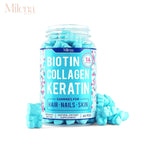What is Collagen?
Collagen is the most abundant protein in the human body, serving as the main structural protein in connective tissues. It's a critical component of skin, bones, cartilage, tendons, and ligaments, providing strength, elasticity, and support.
Think of collagen as the body's natural 'glue' holding everything together. As we age, our natural collagen production decreases, leading to visible signs of aging and potential joint problems. Understanding collagen is key to maintaining youthful vitality and overall well-being.
Types of Collagen
While there are many types of collagen, some of the most important are:
- Type I: Found in skin, bones, tendons, and ligaments. This is the most abundant type.
- Type II: Primarily found in cartilage.
- Type III: Supports the structure of organs and skin.
- Type IV: Found in the basement membranes of tissues.
- Type V: Plays a role in cell growth and development.
Understanding these different types is less crucial for the average consumer, but it highlights the diverse roles collagen plays in the body.
Benefits of Collagen
The benefits of collagen extend beyond just youthful-looking skin. It plays a significant role in various aspects of health:
For Skin:
- Reduces wrinkles and fine lines: Collagen boosts skin elasticity and hydration, leading to a smoother complexion.
- Improves skin hydration: Better hydration means plumper, more youthful skin.
- Enhances skin firmness and elasticity: This contributes to a more toned and lifted appearance.
For Joints:
- Supports joint health: Collagen strengthens cartilage, cushioning and protecting joints.
- Reduces joint pain: This can be especially beneficial for individuals with osteoarthritis.
- Improves joint mobility: Collagen can help maintain flexibility and range of motion.
Other Benefits:
- Stronger hair and nails: Collagen contributes to the strength and health of hair and nails.
- Improved gut health: Collagen may support gut lining integrity.
- Enhanced muscle protein synthesis: Collagen may play a role in building muscle mass.
Sources of Collagen
You can obtain collagen through various means:
Dietary Sources:
While collagen isn't directly found in the same form in food as supplements, some foods are rich in amino acids that help build collagen. These include:
- Bone broth
- Chicken skin
- Fish skin
- Beef
- Eggs
Collagen Supplements:
Collagen supplements are widely available in various forms, including:
- Hydrolyzed collagen: This is a pre-digested form, making it easier for the body to absorb.
- Collagen peptides: Similar to hydrolyzed collagen, peptides are easily absorbed.
- Collagen tablets or capsules: A convenient option for daily intake.
- Collagen powders: Often added to smoothies or other beverages.
When choosing a supplement, look for high-quality products with minimal additives.
How to Maximize Collagen Production
Besides supplements and diet, you can also boost collagen production naturally:
- Maintain a healthy diet: Eat plenty of fruits, vegetables, and protein.
- Get enough sleep: Sleep is essential for cell repair and regeneration.
- Manage stress levels: Chronic stress can negatively impact collagen production.
- Avoid smoking: Smoking damages collagen fibers.
- Protect your skin from the sun: Sun exposure breaks down collagen.
Conclusion
Collagen is a vital protein that plays a critical role in maintaining overall health and youthful appearance. By understanding its benefits and incorporating collagen-rich foods and supplements into your diet, you can support your body's natural collagen production and enjoy the numerous advantages it offers. Remember to consult your doctor before starting any new supplements, especially if you have underlying health conditions.
